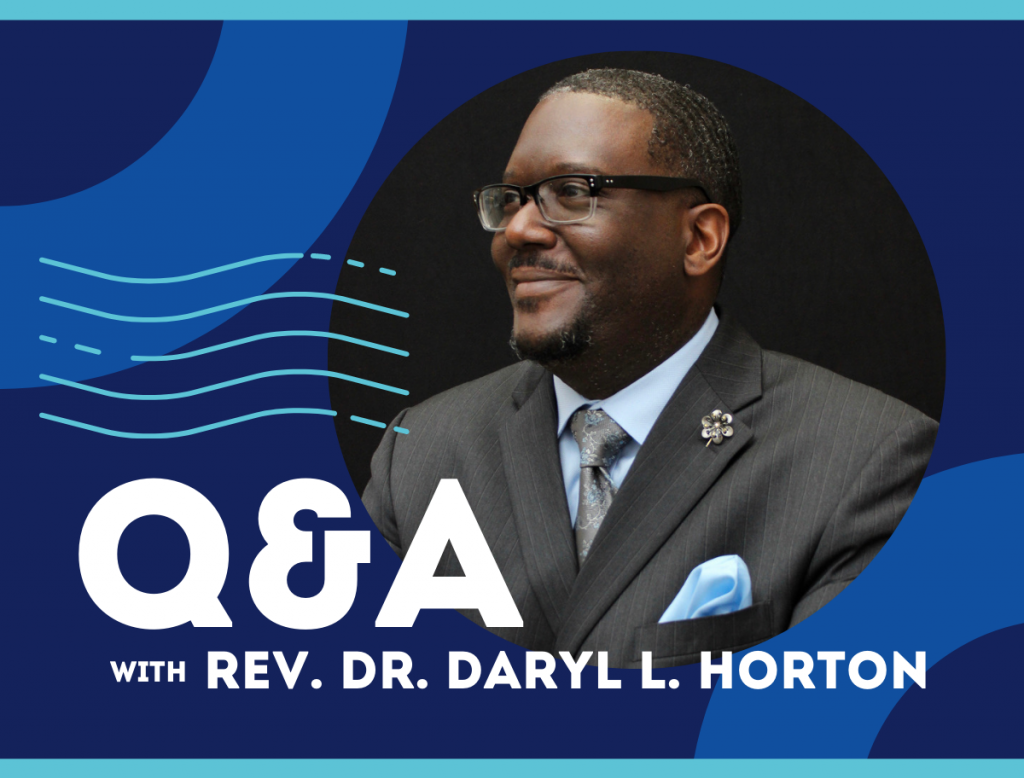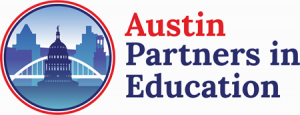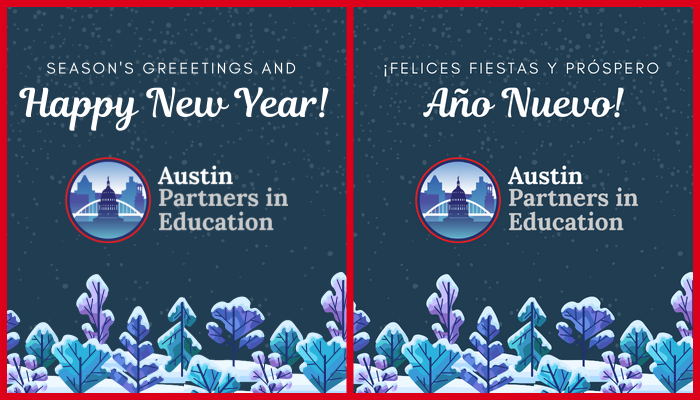
Rev. Dr. Daryl L. Horton သည် Austin ရှိ Mount Zion Baptist Church ၏ APIE ဘုတ်အဖွဲ့ဝင်နှင့် သင်းအုပ်ဆရာဖြစ်သည်။ သူသည် အမှုဆောင်လုပ်ငန်းအတွေ့အကြုံ အနှစ် 20 ကျော်ရှိပြီး လက်ရှိတွင် ရောင်စုံလူမျိုးများတိုးတက်ရေး အမျိုးသားအသင်း (NAACP) နှင့် အော်စတင်နှင့် အနီးတစ်ဝိုက်ရှိ နှစ်ခြင်းခရစ်ယာန်ဝန်ကြီးများသမဂ္ဂ၏ အဖွဲ့ဝင်ဖြစ်သည်။ သူသည် Austin Habitat for Humanity အပါအဝင် Central Texas ရှိ အကျိုးအမြတ်မယူသော အဖွဲ့အစည်းများနှင့် ရပ်ရွာဘုတ်အဖွဲ့များတွင် တာဝန်ထမ်းဆောင်ခဲ့သည်။ Rev. Dr. Horton သည် Ft ရှိ Texas Christian University တွင် Brite Divinity School မှ ဓမ္မပါရဂူဘွဲ့ ရရှိခဲ့ပါသည်။ ထိုက်တန်ပါတယ်။ APIE ဘုတ်အဖွဲ့တွင် အမှုဆောင်ခြင်းအားဖြင့်၊ သူသည် Austin ISD ၏ ကြီးမားသော Austin အသိုင်းအဝိုင်းနှင့် ချိတ်ဆက်မှုဆိုင်ရာ ထိုးထွင်းသိမြင်မှုအသစ်များကို ရရှိလိုပါသည်။ Rev. Dr. Horton သည် လက်ရှိစိန်ခေါ်မှုများအတွက် ဆန်းသစ်သောဖြေရှင်းနည်းများကို မြှင့်တင်ရန် မျှော်လင့်ပါသည်။
မေး- APIE ဘုတ်အဖွဲ့သို့ သင်၏ခရီးအကြောင်း ပြောပြပါ။
A: အတော်လေး ဇာတ်လမ်းတိုလေး ဖြစ်ပါလိမ့်မယ်။ ဒေါက်တာ Cathy Jones နဲ့ မိတ်ဆက်ပေးခဲ့ပြီး ကောင်းမွန်တဲ့ စကားစမြည်ပြောခဲ့ပါတယ်။ APIE က ဘာလုပ်ဆောင်သလဲ နဲ့ အဖွဲ့အစည်းရဲ့ ရပ်တည်ချက်နဲ့ ပတ်သက်ပြီး အချက်အလက်တွေ ပေးခဲ့ပြီး ဘုတ်အဖွဲ့မှာ ပါဝင်ဖို့ စိတ်ဝင်စားလားလို့ မေးခဲ့ပါတယ်။ ကျွန်ုပ်သည် Austin ၏ဇာတိဖြစ်ပြီး LBJ အထက်တန်းကျောင်းမှ AISD ဘွဲ့ရတစ်ဦးဖြစ်သည်။ သူတို့ရဲ့ မစ်ရှင်နဲ့ မတူကွဲပြားမှုတွေနဲ့ သာတူညီမျှမှုတွေနဲ့ လုပ်နေတဲ့ အလုပ်အတွက် ကျွန်မ အရမ်းစိတ်လှုပ်ရှားခဲ့ပြီး ပညာရေးနဲ့ လူငယ်တွေရဲ့ အမာခံပရိသတ်တစ်ယောက်ပါ။
မေး- APIE လုပ်တဲ့အလုပ်က ဘာကြောင့်အရေးကြီးတယ်လို့ ထင်သလဲ။
A: APIE တွင်ကျွန်ုပ်တို့မြင်ရသည့်တန်ဖိုးမှာ ကျွန်ုပ်တို့သည် ပုံမှန်သင်ရိုးညွှန်းတမ်းများနှင့် စာသင်ခန်းတွင်းရှိအရာများကို ကျော်လွန်ပြီး အောင်မြင်ရန် လိုအပ်သည့်အရင်းအမြစ်များမရှိသော သို့မဟုတ် အစဉ်အလာမရှိသော ကျောင်းသားများကို လက်လှမ်းမီခြင်းပင်ဖြစ်သည်။ APIE ပံ့ပိုးပေးသော မတူညီသော ကျောင်းဝင်းများတွင် မတူညီသော ပရိုဂရမ်များကို နှစ်သက်သည်၊ ရရှိနိုင်သော မတူညီသော အသက်မွေးဝမ်းကြောင်းများကို ကျောင်းသားများအား မိတ်ဆက်ပေးကာ အဆိုပါ အသက်မွေးဝမ်းကျောင်းများသို့ ဝင်ခွင့်ပေးသည့် အိမ်ခြံမြေပရိုဂရမ်ကဲ့သို့ပင်၊
ကျောင်းသားများကို အောင်မြင်အောင် ကူညီပေးနိုင်ရန် ဤပရိုဂရမ်များနှင့်အတူ လျှောက်လှမ်းနေသော ကျူရှင်နှင့် လမ်းညွှန်ပေးခြင်းကိုလည်း ကျေးဇူးတင်ပါသည်။ APIE ပရိုဂရမ်များသည် မိသားစုများအတွက်လည်း အကျိုးရှိစေပါသည်။ သားသမီးများကို ခိုင်ခံ့စေသကဲ့သို့ မိသားစုကိုလည်း ခိုင်ခံ့စေပါသည်။
မေး- ယုံကြည်ခြင်းအသိုင်းအဝိုင်းက APIE လုပ်တဲ့အလုပ်နဲ့ ဘယ်လို ဆက်စပ်နေသလဲ။
A: ယုံကြည်ခြင်းအသိုက်အဝန်းတစ်လျှောက်တွင် ချာ့ခ်ျများလုပ်ဆောင်နေသည့်အရာတစ်ခုမှာ ကျောင်းသားများအား ကျူရှင်ပေးခြင်းနှင့် လမ်းညွှန်ပေးခြင်းဖြစ်ပါသည်။ ဇိအုန်တောင်မှာ၊ PIE လို့ခေါ်တဲ့ ပညာရေးမှာ ပါတနာတွေ ရှိတဲ့ ဝန်ကြီးဌာနတစ်ခု ရှိပြီး ကျောင်းသားတွေကို တစ်ပတ်ကို တစ်ကြိမ် ကျူရှင်ပေးတယ်။ ကျောင်းသားတွေကို လမ်းညွှန်ပေးနေတဲ့ ကျမတို့ အမျိုးသမီးငယ်က တကယ်တော့ ဆရာမပါ။ ကျောင်းသားများနှင့် မိသားစုများအတွက် ရှေ့နေတစ်ဦးအဖြစ် တာဝန်ထမ်းဆောင်ရန် ပြဿနာမရှိခဲ့ဘဲ ပြဿနာများကို ဖြေရှင်းပေးနိုင်ရန် လုပ်ဆောင်ခဲ့သည်။
ကျူရှင်ဝန်ဆောင်မှုပေးသော အသင်းတော်များစွာကို ကျွန်တော်သိပါသည်။ ဘုရားကျောင်းများစွာကို ပံ့ပိုးပေးသော Education Connection ဟုခေါ်သော အစီအစဉ်တစ်ခုရှိသည်။ ကျွန်ုပ်တို့သည် သူငယ်တန်းမှ တတိယတန်းကျောင်းသားများထံ ဆက်သွယ်ပြီး ကျောင်းသားများကို စာဖတ်ရန်နှင့် စာတတ်မြောက်မှု တိုးတက်စေရန် ကူညီပေးပါသည်။ ငါတို့ရဲ့တန်ဖိုးတွေက အများကြီးထပ်နေတယ်ဆိုတာ ငါမြင်တယ်။ ကျွန်ုပ်တို့ နှစ်ဦးစလုံးသည် ကျွန်ုပ်တို့၏ ကျောင်းသားများအား အဆင်သင့်ဖြစ်နေကြောင်း သေချာစေရန်နှင့် အဆိုပါ ပံ့ပိုးကူညီမှုများကို ပံ့ပိုးပေးစေလိုပါသည်။ ယုံကြည်ခြင်းအသိုက်အဝန်း၏ပန်းတိုင်သည် ကောင်းမွန်သောဝိညာဉ်ရေးအခြေခံအုတ်မြစ်တစ်ခုနှင့် ဘုရားသခင်ကိုချစ်မြတ်နိုးခြင်းရှိရန်ဖြစ်သော်လည်း ကျောင်းသားများသည် ကောင်းမွန်သောပညာရေးမရှိပါက ၎င်းတို့၏ဝိညာဉ်ရေးအသက်တာကိုလည်း အကျိုးသက်ရောက်နိုင်သည်ကို ကျွန်ုပ်တို့သိပါသည်။ ကျွန်ုပ်တို့သည် ကျွန်ုပ်တို့၏ကလေးများကို ထောက်ပံ့ရန် လက်တွဲ၍ လျှောက်လှမ်းနိုင်မည်ဟု ယုံကြည်ပါသည်။
မေး- လာမယ့်နှစ်တွေမှာ ပညာရေးမှာ တွေ့ရတဲ့ အကြီးမားဆုံး စိန်ခေါ်မှုတွေက ဘာတွေလဲ။
A: ကပ်ရောဂါနှင့် အဝေးသင်သင်ကြားမှုသည် ကျွန်ုပ်တို့၏ကျောင်းသားများအတွက်သာမက ကျွန်ုပ်တို့၏ဆရာများ၊ ကျောင်းအုပ်များနှင့် စီမံခန့်ခွဲသူများအတွက်လည်း ကြီးမားသောစိန်ခေါ်မှုများကို ပေးဆောင်သည်ဟု ကျွန်ုပ်တကယ်ထင်ပါသည်။ ကပ်ရောဂါရှိနေသရွေ့ အဝေးကကျောင်းသားတွေကို ဘယ်လိုအကောင်းဆုံးပညာပေးရမလဲ ဒါမှမဟုတ် ကျောင်းသားတွေ စာသင်ခန်းထဲမှာ အချိန်အများကြီးမဖြုန်းနိုင်တဲ့ ဒီလိုသဘာဝမျိုးတွေရှိနေသရွေ့ အဝေးကကျောင်းသားတွေကို ဘယ်လိုပညာပေးရမလဲဆိုတာကို ပျံသန်းလေ့လာဖို့ လိုအပ်ပါတယ်။
ကံမကောင်းစွာပဲ၊ ကပ်ရောဂါကိုဖြတ်ကျော်ပြီး စိန်ခေါ်မှုတွေ အများကြီးပေါ်လာတယ်။ အဝေးသင်သင်ကြားမှုနှင့်အတူ၊ သင့်တွင် Wi-Fi၊ သို့မဟုတ် လက်ပ်တော့ သို့မဟုတ် မိသားစုပံ့ပိုးမှုမရှိပါက သင်ယူမှုသည် အလွန်စိန်ခေါ်မှုဖြစ်လာသည်။ ကပ်ရောဂါသည် ကျွန်ုပ်တို့အတွက် အခွင့်ကောင်းမရှိသော အသိုင်းအဝိုင်းတွင် အချိုးအစားမမျှသော ကျောင်းသားဦးရေ ရှိနေကြောင်း ဖော်ထုတ်တွေ့ရှိခဲ့သည်။
နည်းပညာသည်လည်း စိန်ခေါ်မှုတစ်ခု ဖြစ်လာနိုင်သည်။ ကျောင်းသားတွေကို သင်ယူရာမှာ အထောက်အကူဖြစ်စေဖို့ အဲဒါကို ဘယ်လိုအသုံးချရမလဲဆိုတာကို စဉ်းစားရပါမယ်။ နည်းပညာသည် ကျောင်းသားများ၏ဘဝ၏ ကြီးမားသောအစိတ်အပိုင်းဖြစ်ပြီး ကျွန်ုပ်တို့ပြောဆိုဆက်ဆံပုံကို အကျိုးသက်ရောက်စေသည်။ ၎င်းသည် ကျွန်ုပ်တို့၏ဘဝကဏ္ဍတိုင်းကို သက်ရောက်မှုရှိပြီး ၎င်းကို အကောင်းဆုံးအသုံးပြုနည်းကို လေ့လာရန် ကျွန်ုပ်တို့ ရုန်းကန်နေရပါသည်။ ကျောင်းသားတွေကို အဟန့်အတားမဖြစ်ဘဲ ကျောင်းသားတွေကို အထောက်အကူဖြစ်စေမယ့် နည်းလမ်းကို ရှာဖွေရပါမယ်။
မေး- အနာဂတ်မှာ APIE အကောင်အထည်ဖော်ဖို့ ဘယ်အချက်တွေကို မြင်ချင်လဲ။
A: APIE လုပ်တဲ့အလုပ်တွေအားလုံးကို ကျွန်တော်လေ့လာနေဆဲပါ၊ ဒါပေမယ့် အဖြေတစ်ခုရမယ်ဆိုရင်တော့ ကျောင်းသားတွေ မကြာခဏမတွေးတတ်တဲ့ အသက်မွေးဝမ်းကြောင်းအလုပ်တွေနဲ့ အသက်မွေးဝမ်းကြောင်းအလုပ်တွေမှာ ကျွန်တော်တို့ကို ပိုပြီးစွန့်စားကြည့်ချင်ပါတယ်။ ကျွန်ုပ်တို့၏ကျောင်းအချို့သည် မီးသတ်ဌာန၊ ဆေးဘက်ဆိုင်ရာနယ်ပယ်များနှင့် အလုပ်လုပ်သည်ကို သိပြီး ကျောင်းသားများကို သမားရိုးကျမဟုတ်သောနယ်ပယ်များတွင် ထိုးထွင်းသိမြင်နိုင်သော အလုပ်အကိုင်များ ပေးဆောင်နိုင်သည့် အလုပ်အကိုင်များ ရှိသေးလားဟု တွေးမိပါသည်။
ဒါက Austin ပါ၊ ငါတို့ဟာ နည်းပညာမြို့တစ်မြို့ဖြစ်တယ်ဆိုတာ ငါသိပါတယ်၊ ဒါပေမယ့် သုတေသနတစ်ခုလုပ်ဖို့ နဲ့ Austin ဘယ်ကိုသွားနေလဲ၊ ဘယ်လမ်းကြောင်းနဲ့ အလုပ်အကိုင်တွေကို ပံ့ပိုးပေးနိုင်မလဲဆိုတာကို စောင့်ကြည့်စေချင်ပါတယ်။
မေး- ဒီစိန်ခေါ်မှုနှစ်အနည်းငယ်အတွင်းမှာ မင်းကို မျှော်လင့်ချက် ဒါမှမဟုတ် ပျော်ရွှင်မှုပေးတဲ့အရာက ဘာလဲ။
A: တချို့အရာတွေတော့ ရှိပါတယ်၊ ဒါပေမယ့် တကယ်ကို မျှော်လင့်ချက်နဲ့ ပျော်ရွှင်မှုကို ပေးတာကတော့ မျိုးဆက်သစ်လူငယ်တွေကို ကြည့်ရတာနဲ့ လူမှုရေးကိစ္စတွေနဲ့ သူတို့နဲ့သက်ဆိုင်တဲ့အရာတွေအကြောင်း သတ္တိရှိရှိနဲ့ ထုတ်ပြောရဲတဲ့ သူတို့ရဲ့ ရဲရင့်မှု၊ ကျွန်ုပ်တို့တွင် ပြီးပြည့်စုံသောမုန်တိုင်းဟု ခေါ်ဝေါ်ခြင်းမှာ အံ့ဩစရာပင်—ကူးစက်ရောဂါ၊ လူမျိုးရေးပြဿနာများ၊ ရဲတပ်ဖွဲ့နှင့် အချို့သောအသိုင်းအဝိုင်းများကြား ထိပ်တိုက်ရင်ဆိုင်မှုများ—နှင့် အသက် 20 နှင့် 30 အရွယ်ရှိလူများသည် ၎င်းတို့၏အသံများကို မျှဝေကြပြီး ပြဿနာများကို မည်သို့ဖြေရှင်းနိုင်သနည်း၊ အဘယ်ကြောင့် ဆက်လက်တည်ရှိနေကြသည်ကို ဆွေးနွေးရန် ဒိုင်ယာလော့လုပ်ထားသည်ကို တွေ့ရခြင်းမှာ အံ့သြစရာကောင်းပါသည်။ လူမှုရေးနဲ့ ပြည်သူ့ရေးရာကိစ္စတွေမှာ သူတို့ရဲ့ ပါဝင်ပတ်သက်မှုက ကျွန်တော့်ကို တကယ်မျှော်လင့်ချက်ပေးတယ်။
ဒုတိယအချက်မှာ လွန်ခဲ့သည့် နှစ်နှစ်အတွင်း ယုံကြည်ခြင်းအသိုင်းအဝိုင်းက တုံ့ပြန်သည့်နည်းလမ်းဖြစ်သည်။ ကျွန်ုပ်တို့သည် လူများလာရောက်ဝတ်ပြုနိုင်သော အဆောက်အအုံတစ်ခုရှိလေ့ရှိသောကြောင့် ဤအသင်းတော်အတွက် စိန်ခေါ်မှုအချိန်တစ်ခုဖြစ်သည်။ ကျွန်ုပ်တို့သည် လိုက်လျောညီထွေဖြစ်အောင် လုပ်ဆောင်ခဲ့ရသော်လည်း ဇိအုန်တောင်သည် ကောင်းမွန်သော ပြုပြင်ပြောင်းလဲမှုကို လုပ်ဆောင်ခဲ့သည်။ ကျွန်ုပ်တို့၏ကွန်မြူနတီရှိ အကြီးတန်းအဖွဲ့ဝင်များသည် အိမ်မှဝတ်ပြုရန်အတွက် Zoom နှင့် YouTube ကို အသုံးပြုနည်းကို သင်ယူခဲ့ကြသည်။ ကျွန်ုပ်တို့သည် အွန်လိုင်းတွင် ကျွမ်းကျင်တတ်မြောက်ရန် သင်ယူပြီးပြီဖြစ်သောကြောင့် ကပ်ရောဂါသည် ကျွန်ုပ်တို့၏ယုံကြည်ခြင်းကို အသက်သွင်းခြင်းမှ မရပ်တန့်သွားပါ။ မျိုးဆက်တိုင်းတွင် သင်ယူရန်နှင့် လိုက်လျောညီထွေဖြစ်အောင်၊ အတူတကွလုပ်ဆောင်နိုင်သည့် စွမ်းရည်ရှိသည်ကို ကျွန်ုပ်တို့တွေ့မြင်ခဲ့ရသည်။
မနှစ်က ဆောင်းရာသီမှာ မုန်တိုင်းကျလာတာ တစ်နှစ်ရှိပြီ။ အသိုက်အဝန်းမှ အခြားယုံကြည်သူခေါင်းဆောင်များနှင့် ကျွန်ုပ်တို့တွေ့ဆုံခဲ့ပြီး၊ ၎င်းတို့နှင့် အခန်းထဲတွင်ရှိကာ မနှစ်က ကျွန်ုပ်တို့ကို သတိမထားမိခဲ့သောအရာများနှင့် အနာဂတ်တွင် ကျွန်ုပ်တို့၏အသိုင်းအဝိုင်းကို မည်သို့မည်ပုံပိုကောင်းအောင် ပြုစုစောင့်ရှောက်နိုင်ပုံအကြောင်း ဆွေးနွေးရခြင်းသည် အလွန်အံ့သြစရာကောင်းပါသည်။ ကပ်ရောဂါနှင့် ဆောင်းရာသီ မုန်တိုင်းသည် ကျွန်ုပ်တို့၏ မျက်လုံးများကို ပိုမိုကျယ်ပြန့်သော အသိုက်အဝန်းကို ဖွင့်ပေးခဲ့သည်။ မိမိကိုယ်ကို ဂရုစိုက်ရုံသာမက ပိုမိုကျယ်ပြန့်သော အသိုက်အဝန်းကိုလည်း ဂရုစိုက်ရန် စဉ်းစားရမည်ဖြစ်ပါသည်။ အားလုံး ရှင်သန်နိုင်ဖို့ အခွင့်အလမ်းတွေ အတူတကွ လက်တွဲလုပ်ဆောင်ဖို့ သင်ယူရပါမယ်။
မေး- အခု ရုန်းကန်နေရတဲ့ ကျောင်းသား ဒါမှမဟုတ် မိသားစုကို ဘယ်လို အကြံဉာဏ်ပေးမလဲ။
A: အရင်ဆုံး အကူအညီတောင်းဖို့ မကြောက်ပါနဲ့လို့ ပြောချင်ပါတယ်။ ကျွန်ုပ်တို့လုပ်နိုင်သော အဆိုးဆုံးအရာတစ်ခုမှာ တိတ်ဆိတ်စွာ ခံစားနေရခြင်းဖြစ်သည်။ ပညာရေး၊ ငွေကြေး သို့မဟုတ် အကြံပေးခြင်း-သင်လိုအပ်သည်ဖြစ်စေ-သူတို့လိုအပ်သမျှအကူအညီ-သူတို့ကိုကူညီရန်လူများနှင့် အရင်းအမြစ်များရှိနေသောကြောင့် အကူအညီတောင်းရန် မကြောက်ပါနှင့်။
ဒုတိယပြောချင်တာက မျှော်လင့်ချက်ကို ဘယ်တော့မှ အရှုံးမပေးဘဲ ကြိုးစားမှုကို ဘယ်တော့မှ မရပ်တန့်ဖို့ပါပဲ။ မျှော်လင့်ချက်ဆိုတာ ငါတို့ကို ရှေ့ကို ဆက်တိုးစေမယ့် အရာတစ်ခုလို့ ငါထင်တယ်၊ ဒါကိုလည်း ကျော်ဖြတ်နိုင်မယ်ဆိုတာ အသိအမှတ်ပြုတယ်။ မုန်တိုင်း၏အလယ်တွင် ကျွန်ုပ်တို့ကို ဖြတ်တောက်ပစ်လိုက်ပြီး ကျွန်ုပ်တို့သည် မည်သည့်အခါမှ လွတ်မြောက်နိုင်မည်မဟုတ်ဟု ကျွန်ုပ်တို့ထင်မြင်ပါသည်။ ဒါပေမယ့် မိသားစုတွေရဲ့ သမိုင်းကြောင်းကို ကြည့်ပြီး တခြားမိသားစုတွေနဲ့ ကျွန်တော်တို့ရဲ့ ကျောင်းခရိုင်ရဲ့ သမိုင်းကြောင်းတွေကို လေ့လာကြည့်ဖို့ တိုက်တွန်းပြီး အလားတူ စိန်ခေါ်မှုတွေကို ခံနိုင်ရည်ရှိတဲ့ တခြားသူတွေလည်း အများကြီးရှိတယ်ဆိုတာ သူတို့တွေ့ပါလိမ့်မယ်။ သူတို့သည် ယုံကြည်ခြင်းရှိသူများဖြစ်လျှင် မျှော်လင့်ချက်မပျက်စေဘဲ သူတို့၏ယုံကြည်ခြင်းကို အားကိုးရန် ငါပြောမည်။ မင်းရဲ့ပတ်ဝန်းကျင်ကလူတွေကို လက်လှမ်းမှီပြီး သူတို့ရဲ့အိပ်မက်တွေကို လိုက်ရှာပြီး နေရောင်ပြန်လင်းလာလိမ့်မယ် လို့ ပြောချင်ပါတယ်။
မေး- APIE ကဲ့သို့ အကျိုးအမြတ်မယူသော အဖွဲ့အစည်းများသည် မတူကွဲပြားခြင်း၊ သာတူညီမျှမှုနှင့် ပေါင်းစည်းခြင်းလုပ်ငန်းတွင် ပါဝင်ရန် အဘယ်ကြောင့် အရေးကြီးသနည်း။
A: ကျွန်ုပ်တို့အားလုံးသည် အချို့သော ရှုထောင့်များဖြင့် ကြီးပြင်းလာကြပြီး ၎င်းနှင့် ထိတွေ့မိသည်အထိ သင်မသိသောအရာကို သင်မသိနိုင်ပါ။ ကျွန်ုပ်တို့သည် ပိုမိုကောင်းမွန်သော ရှုထောင့်များနှင့်အတူ လူကောင်းများဖြစ်လာကြောင်း ကျွန်ုပ်တို့ သိရှိလာရပါသည်။ ဤမတူကွဲပြားသောရှုထောင့်များကို မီးမောင်းထိုးပြခြင်းဖြင့် လူများကို ၎င်းတို့၏လုပ်ဖော်ကိုင်ဖက်၊ သို့မဟုတ် ၎င်းတို့၏ကျောင်းသားများ၊ သို့မဟုတ် ဘုတ်အဖွဲ့ဝင်များ၏ မှန်ဘီလူးမှတစ်ဆင့် မြင်နိုင်စေပြီး အခြားတစ်ယောက်၏ဖိနပ်တွင် လမ်းလျှောက်ရခြင်းကို မြင်နိုင်ရန် ကူညီပေးသည်။ မတူကွဲပြားမှုနှင့် ပေါင်းစည်းမှုသည် ပိုမိုခိုင်မာသော ယဉ်ကျေးမှုကို တည်ဆောက်ရန် အထောက်အကူဖြစ်စေပါသည်။ အဲဒါက ကျွန်တော်တို့ကို ပိုမိုရင်းနှီးလာစေပြီး ကျွန်တော်တို့အားလုံး တူညီတဲ့အရာတွေကို မျှဝေပေးတယ်ဆိုတာကို နားလည်စေပါတယ်၊ ဒါပေမယ့် မတူညီတဲ့အရာတွေကို ခွဲဝေယူဖို့ မလိုအပ်ပါဘူး။ မတူညီမှုတွေကို တန်ဖိုးထားနိုင်ပြီး တစ်ယောက်ကိုတစ်ယောက် ပိုတန်ဖိုးထားနိုင်ပါတယ်။ ကျွန်တော်တို့ရဲ့ ယဉ်ကျေးမှုရဲ့ တစ်စိတ်တစ်ပိုင်းဖြစ်တဲ့ လူတိုင်းကို ဂုဏ်ပြုဖို့ ဆက်လက်လုပ်ဆောင်ဖို့ တိုက်တွန်းပါတယ်။
Mary Hausle၊ P-TECH ပရိုဂရမ် သုတေသနနှင့် ပရောဂျက်မန်နေဂျာ၊ APIE မှ တွေ့ဆုံမေးမြန်းထားသည်။


